tough business:
a parker site
The Score
Published: 1964.
AKA: Killtown, Death Comes in Shes.
Cover Artist: Harry Bennett.
Publisher: Pocket Books.
Cover blurb: "Twelve racketeers take over a whole town".
Synopsis: Parker takes on a seemingly impossible job: knock over a whole town with the help of eleven accomplices.
Adaptations: - Mise à Sac (1967), directed by Alain Cavalier and starring Michel Constantin.
- Richard Stark's Parker: The Score (2012), graphic novel by Darwyn Cooke and published by IDW.
Notes: - Alan Grofield and Mary Deegan's first appearances.
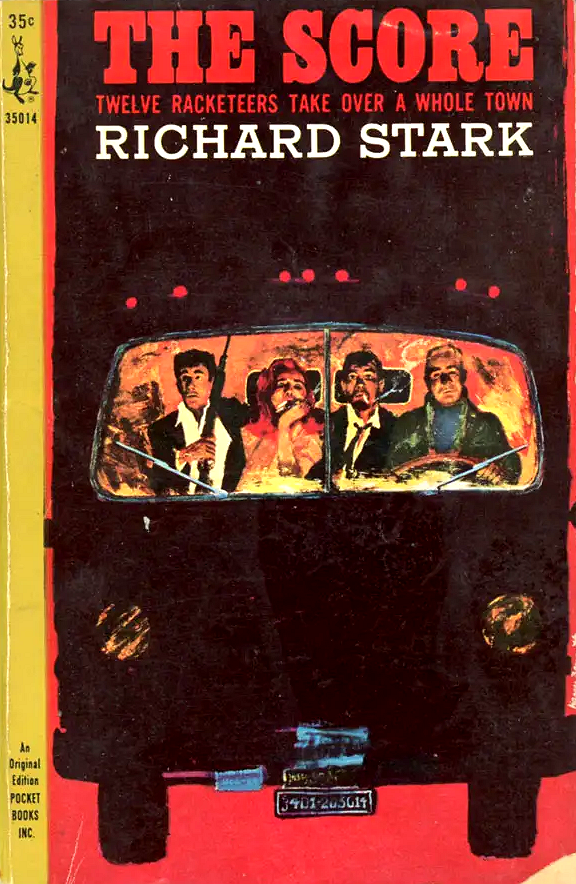
Gallery:
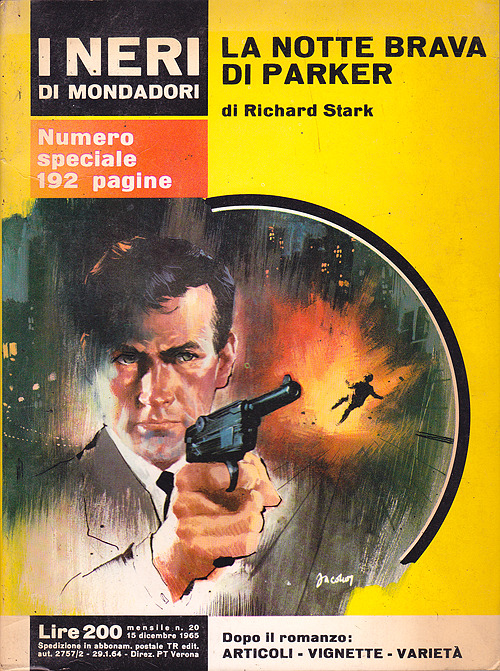
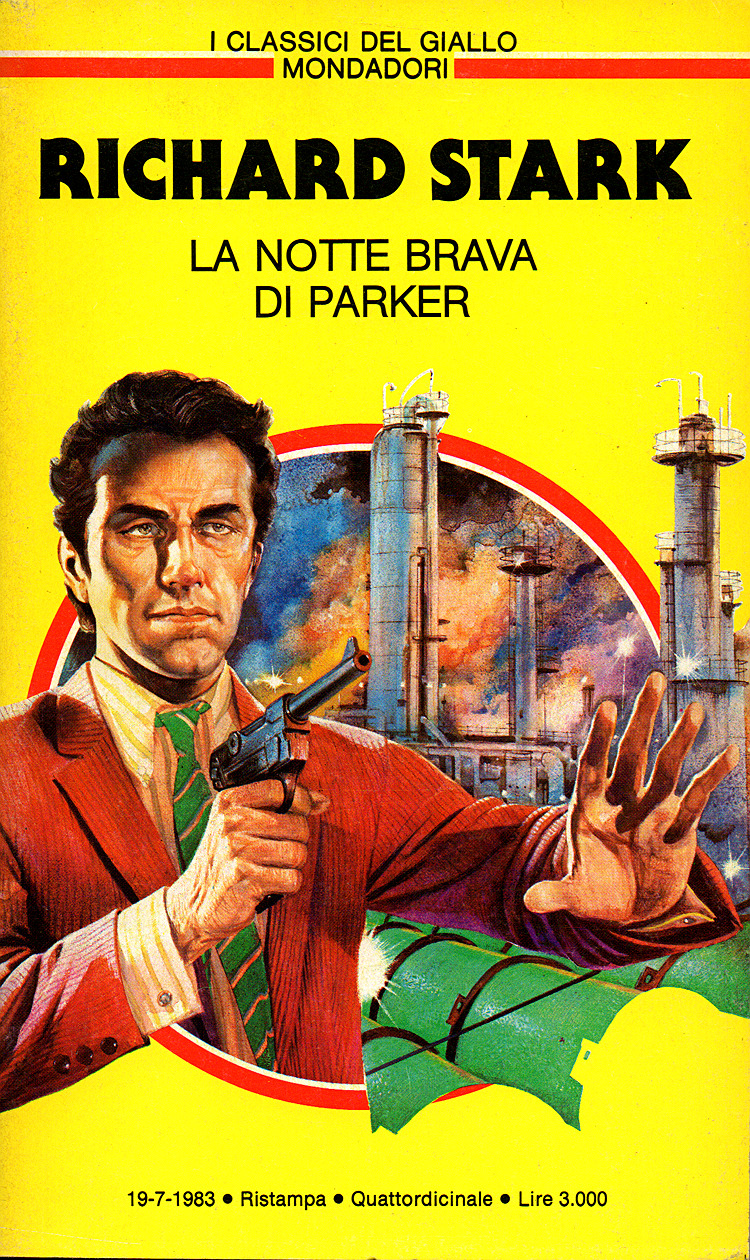
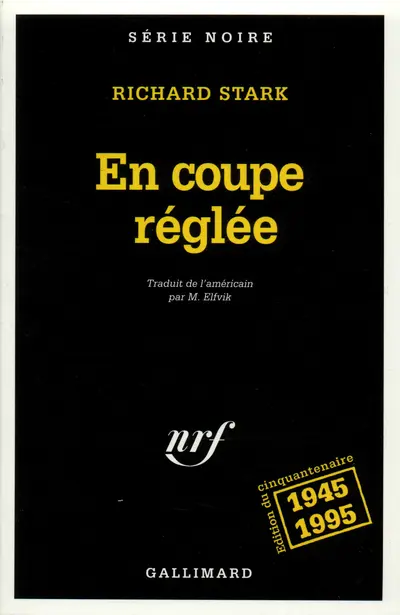
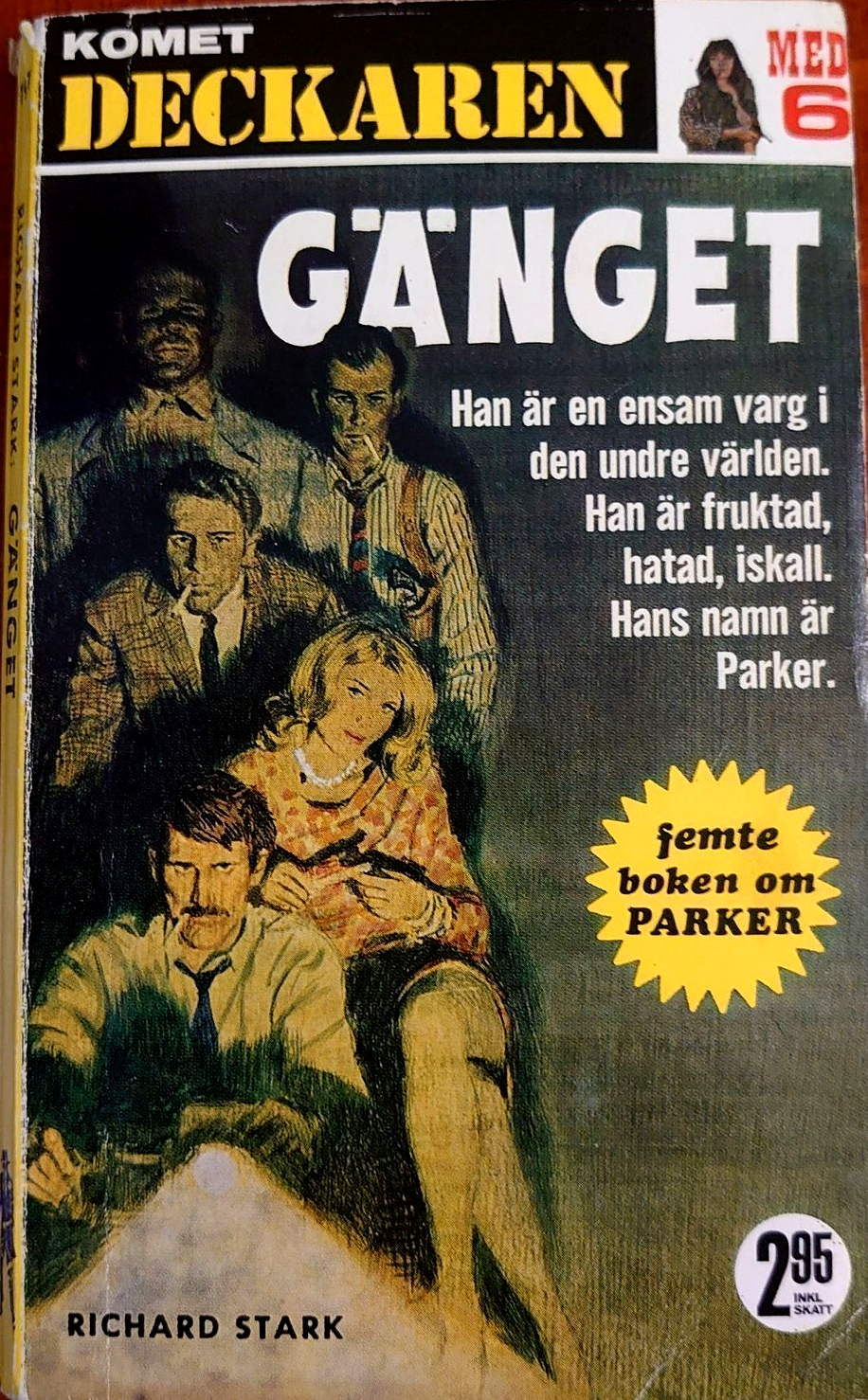
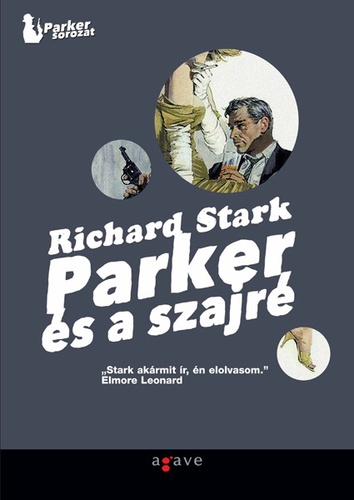
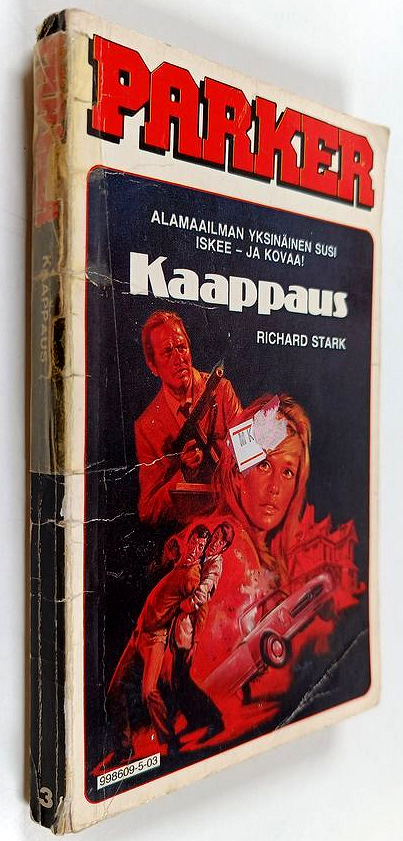
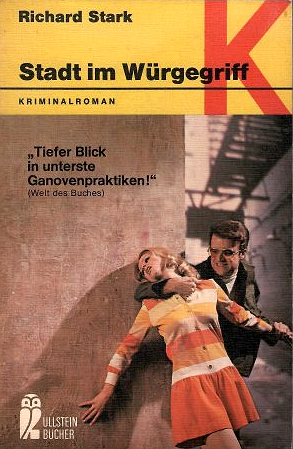
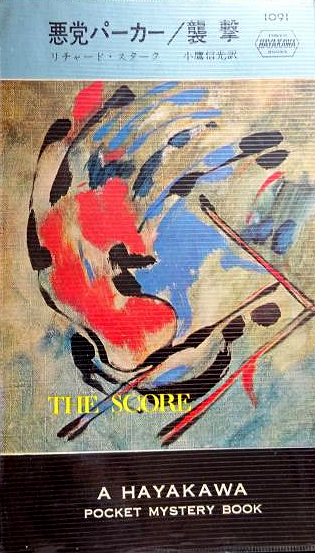
Review:
The Score, the fifth entry in the Parker series, is a particular favorite among readers, having been adapted not only by Darwyn Cooke as a comic but also by French director Alain Cavalier as the film Mise à Sac. The novel introduces a few recurring characters as part of its large cast, including Alan Grofield, and notably features the biggest job Parker would take on -- robbing an entire town.
To that extent, The Score sets the tone for the rest of the series. The previous three installments had been preoccupied with tying up loose ends leftover from The Hunter, but The Score presents a new kind of story revolving around the mechanics of the heist. If the remainder of the Parker novels follow the intricacies of putting together and pulling off a job, then this novel’s other recurring element becomes as vital as its plot structure. Alan Grofield appeared in three more Parker novels after his introduction, and starred in his own spin-off series of four solo novels.
Grofield isn't just the deuteragonist of Stark's books or the cause of the most intense and palpable emotions Parker ever shows in the entirety of the original sixteen novels, he's also an extraordinarily complex and compelling character. He's immediately set apart from the other men both by Parker's description of him ("an intense, lean, handsome man who sometimes acted in summer stock theaters"), and his flamboyant manner of speaking ("Just a graphic illustration of the point, dear heart. [...] Essence of theater.") Grofield primarily speaks in literary references, but his perpetual financial troubles point to no social class differences between him and the other men in on the job; it's merely a matter of very different personalities.
Most characters evolve over time, as Parker himself did from his introduction in 1962 to the book at hand, but one of the most striking aspects of Grofield is that he seems to have arrived fully formed; Stark's characterization is so strong, the second chapter of the second part effectively forgoes dialogue tags altogether when Grofield and Parker are talking, and causes no confusion by doing so. Additionally, Grofield's initial POV chapter is one of the most solid pieces of writing in an already impressive novel.
To begin with, his respect and admiration for Parker makes him stand out among the rest of the cast -- if the previous chapter states, "Chambers wasn't so sure about Parker. He was supposed to be sharp and cool and efficient, but Chambers wasn't so sure," then Grofield is delighting in watching Parker work. His every trait present in The Score is later expanded on in his solo adventures, from his tendency to hear an accompanying soundtrack in his head to his carelessness with money to his dubious relationship with reality and his fear of humiliation.
Grofield’s enjoyment of watching Parker work reveals a great contrast in Parker on and off the job. He thinks about Parker being “all psychology” when he deals with hostages, but also considers him to be “about as subtle as a gorilla” while not on a heist. Despite seeming to know Parker better than others, Grofield’s perception of Parker off the job here matches that of the average man he works with. Stark goes to great lengths to differentiate between Parker at work, and Parker thrust into 'regular' social situations. Parker's efficiency during a heist is often dependent on a well-established routine; he knows how to handle hostages quickly, calmly, and easily, having done it often enough to have developed a method that gets him the desired results. On the other hand, faced with trying to get information out of Edgars' girl, Parker thinks, "being no good at small talk was sometimes a disadvantage." Parker feels troubled by the possibility of Edgars’ personal feelings getting in the way of the job, and at this point in the story, he’s unaware of exactly how dangerous Edgars will end up being.
Despite seeming cold to the other men on the job, Parker always goes to great lengths to make sure everything turns out well for them. In this instance, he chooses to believe in the skeleton of a plan Edgars has formed, and helps him fill in the gaps with good men and solid ideas. Parker’s dedication to the job is arguably what saves them in the end, because despite all of the destruction and bloodshed Edgars causes, everyone has a way out because nearly every other possibility had been accounted for. Stark writes Edgars destroying the police station and fire station with precision but doesn’t spare the occasional gruesome detail to drive home how horribly wrong it’s all gone (“Officer Nieman lay bleeding in the middle of the floor, nearly shot in two.”) Parker doesn’t let his own personal feelings get in the way of a job, but he can’t account for a wildcard like this, and he can’t account for what Grofield does, either.
Taking Mary Deegan with him never seemed like a particularly good idea to Grofield, but seeing as she’d already seen his face and learned his name, which she points out herself, it would be a bad idea to leave her behind now. This decision is immediately seen to be unwise by the other men on the job, and curiously, they’re all worried about Parker’s reaction more than the danger of bringing along a stranger to the hideout. Parker sees it as another complication to the job, and his feelings are clear once he describes Grofield as being a madman for it on par with Edgars.
It isn’t a matter of sanity, though, just Grofield making a decision “too stupid to be possible” and knowing it, like Parker thinks when he sees Grofield sitting with his future bride in the shabby hideout the men arranged. From the first words Grofield says to him about Mary, Parker knows Grofield is aware of his own stupidity, but his ego prevents him from admitting he’s wrong (“Grofield's voice had the shaky belligerence of a man who's pretty sure he's in the wrong but will be damned if he'll admit it.”) More than frustration or disappointment, what Parker feels the most here is betrayal -- encapsulated in him telling Grofield, “I thought you were a pro.” He expects so much more from him, and Grofield’s half-baked plans and excuses aren’t good enough to justify the risk he’s taking. For all the times Parker fondly tells Grofield to “shut up” throughout the novel, the phrase becomes sharp here when he’s tired of hearing Grofield desperately try to justify himself. Parker only comes around when he talks to Mary himself, going so far as to warn her about all of the reasons Grofield might not be the partner she’s looking for, which points to his startling familiarity with Grofield.
The sudden complication caused by Mary's appearance works twofold; primarily in the obvious way of being yet another personal reason that makes the job turn sour but Parker's reaction to her also betrays a subtextual tension. There are numerous instances denoting his awareness of Mary Deegan as the sole woman in a male-only setting and the danger that poses to her ("Go tell Grofield to show you where his car is. That's where you two will stay nights; we can't have you in the shed with the rest of us.", "Parker had seen Salsa and a couple of the others looking at her. If they couldn't all leave here tonight, there might be trouble yet."), rather than merely the danger that she poses to the job and Parker's livelihood.
The tension persists when Salsa offers the leftover money from the split to Mary and Grofield as a 'wedding present', and we're told, "Parker watched Grofield watching Salsa". On other men, that might be a possessive streak; on Grofield, it's almost certainly a sudden awareness of the commitment he's walked into by bringing Mary along. Just as the rest of the novels set the stage for what’s to come on Parker’s side of things, this also acts as foreshadowing for Grofield and Mary’s life after their eventual marriage. Grofield may be right about the commitment, but it works out better for him than it does for Mary.
The Score contains some of Stark's most complex storytelling, skillfully balancing a large cast of characters and establishing several prominent aspects of the novels while further developing Parker as a character. His dedication to making the job run smoothly is shown in full force for the first time and is subsequently established as a character trait, as is his friendship with Grofield. In fact, it is also Grofield's introduction that marks this as an unmissable entry into the original series.